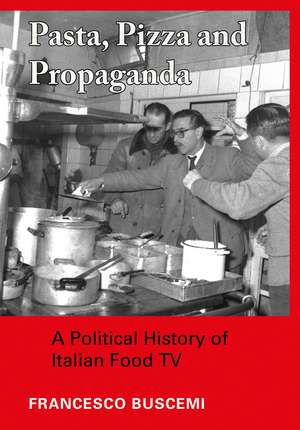Pasta, Pizza and Propaganda: A Political History of Italian Food TV: Trajectories of Italian Cinema and Media
Autor Francesco Buscemien Limba Engleză Hardback – 9 iun 2022
In this dynamic interdisciplinary study at the intersection of food studies, media studies, and politics, Francesco Buscemi explores the central role of food in Italian culture through a political history of Italian food on national television. A highly original work of political history, the book tells the story of Italian food television from a political point of view: from the pioneering shows developed under strict Catholic control in the 1950s and 1960s to the left-wing political twists of the 1970s, the conservative riflusso or resurgence of the 1980s, through the disputed Berlusconian era, and into the contemporary rise of the celebrity chef. Through this lively and engaging work, we learn that cooking spaghetti in a TV studio is a political act, and by watching it, we become citizens.
Preț: 536.87 lei
Preț vechi: 697.22 lei
-23% Nou
Puncte Express: 805
Preț estimativ în valută:
102.74€ • 107.13$ • 85.39£
102.74€ • 107.13$ • 85.39£
Carte disponibilă
Livrare economică 28 februarie-14 martie
Livrare express 13-19 februarie pentru 29.85 lei
Preluare comenzi: 021 569.72.76
Specificații
ISBN-13: 9781789384062
ISBN-10: 1789384060
Pagini: 170
Ilustrații: 12 halftones
Dimensiuni: 170 x 244 x 15 mm
Greutate: 0.47 kg
Editura: Intellect Ltd
Colecția Intellect Ltd
Seria Trajectories of Italian Cinema and Media
ISBN-10: 1789384060
Pagini: 170
Ilustrații: 12 halftones
Dimensiuni: 170 x 244 x 15 mm
Greutate: 0.47 kg
Editura: Intellect Ltd
Colecția Intellect Ltd
Seria Trajectories of Italian Cinema and Media
Notă biografică
Francesco Buscemi is a food and media researcher at the University of Insubria in Como and at the Catholic University of the Sacred Heart in Milan.
Cuprins
Introduction
Chapter 1: Literature Review, Theoretical Framework and Methodology
Politics, Television and Food in Italy: Dangerous Liaisons
Politics in Italy after the Second World War
Television in Italy
Italian Food between reality and stereotypes
Italian food TV
Theoretical framework
Methodology
Conclusion
Chapter 2: Broadcasting Sacred Food: 1954-1970
Soldati's Journey to the Po Valley
Soldati's Conception of Genuineness
Nature and Culture
Culture and the Past
Where are the women?
Soldati's Sacred Food
Linea contro Linea
Conclusion
Chapter 3: 1971-1980: The Ephemeral Wind of Change
A new political scenario
The New scenario on TV: RAI's reformation
A Tavola alle 7
The Relationship between Veronelli and Ninchi
Ninchi, Veronelli and the field of Italian Politics in the 1970s
Dimmi Come Mangi and the Dawn of Neo-TV
Conclusion
Chapter 4: 1981-1999: Going Back Home (and to the Kitchen)
Riflusso and Italy in the 1980s and 1990s
Wilma De Angelis and home cooking
A Pranzo con Wilma
Food Television Becomes a Genre
Conclusion
Chapter 5: Eating TV: Food on Berlusconian Television, 2000-2012
The Celebrity Housewives and their Shows
La Prova del Cuoco
Women Between Power and Stereotype
Serving Sacred Food in Trattoria
The Contrasted Discovery of Foreign Food
Food in the News
Conclusion
Chapter 6: 2012-The Present, The Italian Way to the Celebrity Chef
The Invasion of the Global Formats
A Case of Italian Adaptation: From Kitchen Nightmares to Cucine da Incubo
A Cena da Me: Representing Food to Talk about Something Else
Food Network Italia
The New Celebrity Chefs
Alessandro Borghese e Simone Rugiati
MasterChef
Italian Food out of Italy
Dietary Chefs and their Enemies
The Tough Chef
Female Professional Cooking
Benedetta Rossi, the Anti-chef
Conclusion
Conclusion
Chapter 1: Literature Review, Theoretical Framework and Methodology
Politics, Television and Food in Italy: Dangerous Liaisons
Politics in Italy after the Second World War
Television in Italy
Italian Food between reality and stereotypes
Italian food TV
Theoretical framework
Methodology
Conclusion
Chapter 2: Broadcasting Sacred Food: 1954-1970
Soldati's Journey to the Po Valley
Soldati's Conception of Genuineness
Nature and Culture
Culture and the Past
Where are the women?
Soldati's Sacred Food
Linea contro Linea
Conclusion
Chapter 3: 1971-1980: The Ephemeral Wind of Change
A new political scenario
The New scenario on TV: RAI's reformation
A Tavola alle 7
The Relationship between Veronelli and Ninchi
Ninchi, Veronelli and the field of Italian Politics in the 1970s
Dimmi Come Mangi and the Dawn of Neo-TV
Conclusion
Chapter 4: 1981-1999: Going Back Home (and to the Kitchen)
Riflusso and Italy in the 1980s and 1990s
Wilma De Angelis and home cooking
A Pranzo con Wilma
Food Television Becomes a Genre
Conclusion
Chapter 5: Eating TV: Food on Berlusconian Television, 2000-2012
The Celebrity Housewives and their Shows
La Prova del Cuoco
Women Between Power and Stereotype
Serving Sacred Food in Trattoria
The Contrasted Discovery of Foreign Food
Food in the News
Conclusion
Chapter 6: 2012-The Present, The Italian Way to the Celebrity Chef
The Invasion of the Global Formats
A Case of Italian Adaptation: From Kitchen Nightmares to Cucine da Incubo
A Cena da Me: Representing Food to Talk about Something Else
Food Network Italia
The New Celebrity Chefs
Alessandro Borghese e Simone Rugiati
MasterChef
Italian Food out of Italy
Dietary Chefs and their Enemies
The Tough Chef
Female Professional Cooking
Benedetta Rossi, the Anti-chef
Conclusion
Conclusion
Recenzii
"Buscemi provides in-depth discussions on the important links between British and Italian food culture, television, politics and associated industries and behaviours. [...] [This book] will be valuable to students of television generally, and particularly those taking an interdisciplinary approach to media, food, culture, politics and globalisation. Buscemi provides a capsule case study of the development over sixty years of Italian television and the journey of food through those decades, witnessing changes to gender expectations, ideas of being a ‘better’ Italian and the possibility of food being used to promote a political ‘lie’ (p. 138) to viewers. [It] considers the culinary and cultural capital that the presenters acquire through television appearances and then use in their representations of the politics of food, world events and aspects of our lives which are far from frivolous."







